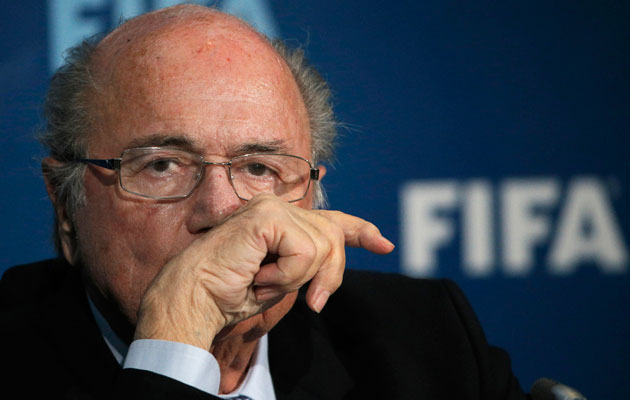Sepp Blatter is leaving his voluntary ‘house arrest’ in Switzerland to attend Saturday’s World Cup draw here in Russia without having succeeded in stemming any of the criticism over his chosen exit route.
FIFA’s leader has been told, in effect, that he is putting the presidential cart before the regulatory horse in hoping to push through reforms minutes before the world football federation’s extraordinary congress elects his successor next February 26.
The criticism comes from Jordan’s Prince Ali bin Al Hussein who caused a major surprise by denying Blatter a first-round victory in the original presidential election on May 29 in Zurich. The accompanying storms caused the 79-year-old Swiss to announce his impending departure four days later.
Blatter’s tied his delayed resignation to a bid to push through reforms to which he had suddenly become a late convert – term limits, pay transparency and centralised formal integrity checks.
Prince Ali considers Blatter out of order in seeking to set strategy and policy for his successor.
Though deposed by the Asian confederation as its FIFA vice-president earlier this year, Prince Ali remains deeply involved in the game through his presidency of the Jordan Football Association and leadership of the the Asian Football Development Programme.
In a statement he said: “We need a clear process, clear timelines, and a very clear remit. And all this should belong to the new president. Although reforms are welcome and much needed, they are the mandate of the new president, not the old one.
“It is the role of the new president to put in place the necessary systems to implement the changes that FIFA so desperately needs, not a task force trying to rush this through in less than 60 days.”
Until his flight to St Petersburg, Blatter had not dared leave the safety of Switzerland since the arrests of seven senior football officials there on a United States judicial indictment in May.
He said on Monday that he wanted to bring about change by resurrecting the stalled reform process through the creation of an 11-strong task force led by an “independent personality” which should report back to the executive committee in September.
Suggestions that this “personality” should be audit and compliance chairman Domenico Scala have been greeted with scepticism though a major figure from outside the game would be difficult to find and empower in so short a time.
Prince Ali added: “How can this task force address change in any meaningful way within such a short timeline? There can be no quick fix to issues that are clearly structural.
“Any task force that really will have the clout to bring about such vital reform should be a totally independent body, not from within the governance structure of FIFA.”
During his election address to congress, Prince Ali had warned, prophetically: “We cannot continue with the crisis in FIFA, a crisis that has been ongoing and is not just relevant to the events of today. FIFA needs leadership that governs guides and protects our national associations — leadership that accepts responsibility for its actions and does not pass blame.”
Blatter has continuously insisted that the corruption storm which has broken over FIFA in the last five years is the responsibility of individuals not the institution.
Prince Ali has yet to make an announcement about whether he consider standing again for the FIFA presidency. He has had some discussions with UEFA president Michel Platini who is the latest popular favourite.
Candidates have until October 26 to present their stipulated five nominations.







